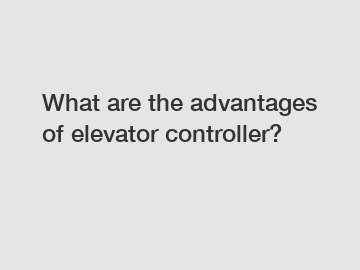What are the advantages of elevator controller?
Elevators have become an integral part of modern life, transforming the way we navigate tall buildings and improving mobility for all. Behind the smooth operation of these vertical transports lies a crucial component - the elevator controller. In this blog, we will explore the myriad advantages of elevator controllers, shedding light on how they enhance efficiency, safety, and convenience in our daily lives.
1. Enhanced Efficiency:
Elevator controllers play a pivotal role in ensuring the smooth operation of elevators, optimizing traffic flow, and reducing waiting times. With the ability to supervise multiple elevators simultaneously, these controllers assess variables such as floor demand, passenger traffic patterns, and service requests, intelligently orchestrating elevator movements. By efficiently coordinating elevator assignments, passengers experience reduced wait times, shorter travel durations, and improved overall efficiency in multi-story buildings. This results in enhanced productivity, especially in high-traffic areas like commercial spaces, offices, and large residential complexes.

2. Advanced Safety:
Safety is paramount when it comes to elevators, and controllers contribute significantly to ensuring passenger well-being. Modern elevator controllers employ state-of-the-art safety features, including advanced door control systems, emergency evacuation protocols, load monitoring, and fault detection mechanisms. These controllers constantly monitor various parameters, such as elevator speed, door status, and load limits, promptly responding to any anomalies or malfunctions. Such proactive safety measures instill confidence in passengers and provide peace of mind, reinforcing the crucial role that elevator controllers play in maintaining safety standards.
3. Intelligent Destination Dispatch:
Incorporating destination dispatch systems within elevator controllers revolutionizes the way elevators operate. By analyzing passengers' intended destinations and grouping them into efficient elevator assignments, destination dispatch ensures optimal passenger distribution and reduces travel times. This system also reduces overcrowding and congestion in elevator lobbies, providing a more pleasant experience for riders while enhancing building security and access control.
4. Personalization and Accessibility:
Elevator controllers have evolved to cater to diverse passenger needs, emphasizing personalized experiences and accessibility. Today's controllers offer intuitive user interfaces, allowing passengers to easily select their desired floor, language preferences, or special requirements. Additionally, modern controllers incorporate accessibility features such as Braille buttons, voice guidance, and tactile feedback, ensuring inclusivity for individuals with disabilities or specific mobility needs.
5. Remote Monitoring and Maintenance:
Elevator controllers equipped with remote monitoring capabilities have transformed maintenance practices for building managers and technicians. These controllers provide real-time data on elevator performance, detecting potential issues and even predicting maintenance requirements. With timely notifications and remote troubleshooting, the efficiency of maintenance operations is improved, further reducing elevator downtime and associated inconveniences.
6. Environmental Considerations:
In recent times, the importance of energy efficiency and sustainability cannot be overstated. Elevator controllers have adapted to this shift, offering energy-saving features like sleep mode activation during periods of low demand, optimizing lighting and ventilation systems within elevator cabins, and employing regenerative drives to capture and reuse excess energy. By reducing energy consumption and carbon footprints associated with elevators, these controllers align with eco-friendly initiatives and contribute to a greener future.
Conclusion:
The advantages of elevator controllers are undeniable, as they play a fundamental role in enhancing the efficiency, safety, and convenience of vertical transportation systems. As the demand for advanced mobility solutions grows, continuous advancements in controller technology will further improve elevator experiences for passengers worldwide. From optimizing traffic flow and ensuring passenger safety to personalization and accessibility features, elevator controllers are indispensable components that significantly impact our daily lives while providing unparalleled convenience and peace of mind.
Are you interested in learning more about patterned stainless steel, elevator stainless steel decorative sheet, size of bead blasted finish stainless steel? Contact us today to secure an expert consultation!


